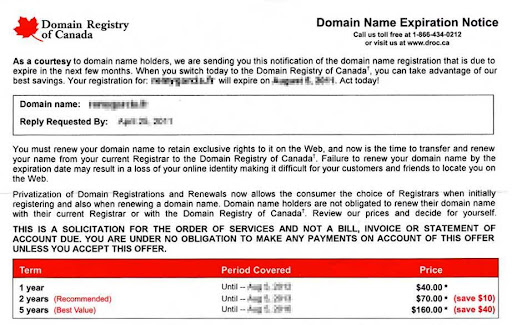
Fraudulent domain name renewal letters
There are numerous frauds on the internet, so be careful! The most common ones are those that affect individuals; however, frauds targeting the owners of all types of businesses are quickly multiplying, regardless of whether or not the businesses have a commercial website. In previous blog posts, we’ve talked about scams aimed at company executives. We’ve specifically discussed scams perpetrated by ill-intentioned people who try to pass themselves off as Google representatives in an attempt to take control of the companies’ identifiers, as well as certain web agencies that are only after people’s money.
Scams related to domain names are nothing new, but unfortunately, they’ve been increasing at an alarming rate lately. That’s why BJMédia has decided to inform you of this fraud whose victims, the owners of website domain names, receive a letter from Domain Registry of Canada asking them to renew those domain names. Don’t ever respond to these letters! Here’s everything you need to know about this clever scheme.
The strategy used by Domain Registry of Canada
A company called Domain Registry of Canada (DROC) is sending fake renewal letters via regular mail or email directly to the owners of domain names. The company has designed these letters in such a way as to lead recipients to believe that they’re from an official government organization or that the issuer is somehow connected to the Canadian Internet Registration Authority (CIRA). DROC even uses a brown window envelope, similar to those the Government of Canada uses for official letters, as well as an official Canada Post postage stamp. The design of the letter resembles a bill, as it requests a payment and urges the domain owner to renew the domain name by the indicated due date, implying that failure to comply will lead to loss of the domain. In the letter, they use statements like “Failure to renew your domain name before the expiration date may lead to loss of your online identity” in order to create a sense of urgency and fear of losing access to the website and emails for an extended period.
DROC perpetrates the same scam using different company names, including “Internet Registry of Canada,” “Domain Registry of America,” “Domain Renewal Group,” “Brandon Gray Internet Services” and “Internet Domain Name Service.” Regardless of the name they use, they always use the same technique to trick domain name owners into transferring the domain name to them.
We are making it a point to inform our clients and other business owners that this is a scam with the goal of stealing their domain names.
Below is an example of such a letter:

What to do if you’re the victim of this attempted fraud
You shouldn’t do anything! In particular, you should never respond to a letter like this or make a payment (obviously). If you pay DROC for the “renewal” of your domain name, DROC will usurp the rights to the name and you’ll no longer be able to manage it fully.
One thing you can do to confirm that the procedure is illegal is to contact your web agency and inform them of the fraudulent letter you’ve received. You can also verify the name of your service provider. It’s essential that you know the name of your provider because this will enable you to quickly determine that the letter from DROC or another company is fraudulent.
Are you wondering how these companies obtain information on domain names? Nothing could be simpler. They consult the public WHOIS database, which is chock-full of information, including detailed contact information on domain name owners and administrators. Therefore, to protect yourself from domain name scams, you can activate the identity protection option on WHOIS to safeguard your personal information, making it inaccessible to spammers and fraudulent companies.
If you’ve received a letter or email from Domain Registry of Canada asking you to renew your domain name, ignore it. If you have any questions or doubts about the legitimacy of a letter or email regarding your domain name, don’t hesitate to contact the experts at BJMédia. It would be our pleasure to inform you and reassure you!
